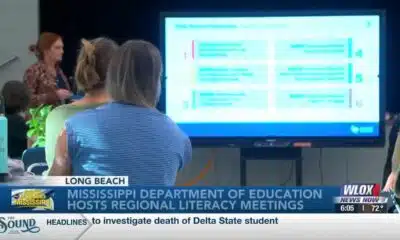News from the South - Arkansas News Feed
Iran launches missiles attacking Israel
SUMMARY: Iran launched nearly 200 ballistic missiles at Israel in retaliation for Israeli attacks on Hezbollah and its offensive in Lebanon, causing sirens and explosions across Israel. As of now, there have been no reported deaths. The U.S. is actively assisting in intercepting the missiles, and in response to the escalating conflict, the Pentagon is deploying additional military support, including three squadrons of aircraft (F-15s, F-16s, and A-10s) and increasing U.S. troop presence in the region by 2,000-3,000 personnel, joining over 40,000 already stationed there.
Escalation in the ongoing struggle in the Middle East continues as more US forces head to help Israel defend itself against an Iranian missile attack.
News from the South - Arkansas News Feed
NW Arkansas Championship expected to bring money to Rogers
SUMMARY: The Northwest Arkansas Championship in Rogers is more than a golf event; it significantly boosts the local economy. Drawing thousands annually, it brings steady crowds benefiting restaurants, shops, and service providers. Businesses report increased sales, especially in food and hydration products, with parking lots near the course filling quickly. The Rogers Chamber estimates the tournament injects around $14 million into the local economy, supporting small businesses. Starting tomorrow with a 5K event at the LPGA, this week-long tournament is a dependable source of customer traffic and highlights Rogers’ growth as a regional hub.
Rogers businesses make money off the LPGA’s NW Arkansas Championship.
40/29 is your home for Northwest Arkansas and the River Valley breaking news and weather. For your latest Northwest Arkansas and the River Valley news and weather visit: https://www.4029tv.com/
For licensing inquiries: https://www.4029tv.com/licensing
News from the South - Arkansas News Feed
Arkansas medical marijuana sales on pace for record year
SUMMARY: Arkansas medical marijuana sales are on track for a record year, with patients spending over $193 million from January to August 2025—more than $10 million higher than last year. The state currently has 109,000 active patient cards, purchasing over 52,000 pounds of cannabis products. Daily sales average around $800,000, generating more than $21 million in taxes this year. A new law directs part of this tax revenue to combat food insecurity, including eliminating school lunch debt statewide. Since 2019, Arkansas patients have spent over $1.5 billion on medical marijuana, with the state collecting more than $105 million in taxes.
Arkansas medical marijuana sales on pace for record year 40/29 is your home for Northwest Arkansas and the River Valley …
News from the South - Arkansas News Feed
Group in lawsuit say Franklin county prison land was bought before it was inspected
SUMMARY: A group filed a complaint against the Franklin County Prison project, claiming the land was purchased before proper inspection, resulting in unsuitable property acquisition and wasted taxpayer money. A study cited by State Senator Brian King revealed the site cannot supply adequate water for even one home, let alone a 3,000-bed prison. Despite ongoing prison overcrowding and the need for a new facility, concerns remain about the project’s viability. Lawmakers discussed the issue, highlighting overcrowding and early release of violent offenders due to lack of space. The Franklin County Prison project aims to build a 3,000-bed facility, but its future is uncertain amid these challenges.
Group in lawsuit say Franklin county prison land was bought before it was inspected
40/29 is your home for Northwest Arkansas and the River Valley breaking news and weather. For your latest Northwest Arkansas and the River Valley news and weather visit: https://www.4029tv.com/
For licensing inquiries: https://www.4029tv.com/licensing
-
News from the South - North Carolina News Feed6 days ago
What we know about Charlie Kirk shooting suspect, how he was caught
-
Local News7 days ago
Russian drone incursion in Poland prompts NATO leaders to take stock of bigger threats
-
Local News Video7 days ago
Introducing our WXXV Student Athlete of the Week, St. Patrick’s Parker Talley!
-
News from the South - North Carolina News Feed6 days ago
Federal hate crime charge sought in Charlotte stabbing | North Carolina
-
The Center Square7 days ago
Weapon recovered as manhunt continues in Kirk assassination investigation | National
-
News from the South - Arkansas News Feed5 days ago
NW Arkansas Championship expected to bring money to Rogers
-
Our Mississippi Home5 days ago
Screech Owls – Small but Cute
-
News from the South - Tennessee News Feed7 days ago
Middle Tennessee State University dean filed over Kirk comments | Tennessee











































